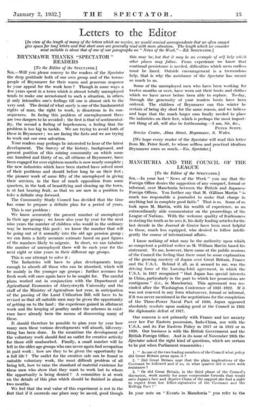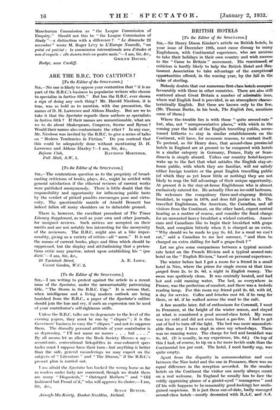MANCHURIA AND THE COUNCIL OF THE LEAGUE
[To the Editor of the SPECTATOR.]
SIR, —In your last " News of the Week " you say that the Foreign Office denies the suggestion of any compact, formal or informal, over Manchuria between the British and Japanese Foreign Offices. You further say that M. %Wiliam Martin " is much too responsible a journalist to make that charge in anything but in complete good faith." That is so. Some of us look upon M. Martin, with his wealth of experience, as an extraordinarily able commentator on the proceedings of the League of Nations. With the welcome quality of fearlessness In stating the truth as he sees it, his daily leading articles for the last decade in the Journal de Geneve have been most helpful to those, much less equipped, who desired to follow intelli- gently the course of international affairs.
I know nothing of what may be the authority upon which so competent a political writer as M. William Martin based his statement. To me, however, there came at the public sessions of the Council the feeling that there must be some explanation of the growing mastery of Japan over Great Britain, France and the U.S.A. Behind it all, as it seemed to me, was the driving force of the Lansing-Ishii agreement, in which the U.S.A. in 1917 recognized " that Japan has special interests in China, particularly in the part to which her possessions are contiguous " (i.e., in Manchuria). This agreement was res- cinded after the Washington Conference of 1921-1922. If it was not renewed in any form whatsoever, formal or informal, if it was never mentioned in the negotiations for the completion of the Three-Power Naval Pact of 1930, Japan appeared absolutely resolute upon making good at the Council in 1931 the diplomatic defeat of 1917.
Our concern is not primarily with France and her anxiety over her Far Eastern possession, Indo-China, nor with the U.S.A. and its Far Eastern Policy in 1917 or in 1922 or in 1930. Our business is with the British Government and the British Foreign Office. And in its issue of November 28th the Spectator asked the right kind of questions, which are certain to be put when Parliament reassembles : 1. " As one of the two loading members of the Council what policy did Great Britain press upon it ?
2. " Did Great Britain urge that the plain implications of the Covenant be followed and if so, in what quarter did it meet with resistance ?
3. " Or did Great Britain, in the third phase of the Council's discussion, work merely for some compromise formula that would save Japan's face and deprive China of the support she had a right to expect from her fellow-signatories of the Covenant and the Kellogg Pact Y"
In your note on " Events in Manchuria " you refer to the Manchurian Commission as " the League Commission of Enquiry." Should not this be " the League Commission of
Study distinction with a difference ? " Le dimarache 22 novembre" wrote M. Roger Levy in L'Europe Nouvelle, " un point est precise : la commission internationale sera d'etudes et non d'enquae : elle durera trois ou quake tnois."—I am, Sir, &c.,
Radyr, near Cardiff.
GWILYM DAVIES. '







































 Previous page
Previous page